
views
X
Trustworthy Source
Journals of the American Heart Association
Open Access, peer-reviewed journals focusing on cardiovascular and cerebrovascular diseases, as well as related scientific research.
Go to source
Your CBP is the amount of pressure inside your aorta, which is the main artery that sends blood throughout the body from your heart. If you’re concerned about your blood pressure and your possible risk of heart disease, stroke, or other health problems, ask your doctor if they have a tonometer or a special cuff that can measure your CBP.
Getting Tested in Your Doctor’s Office

Ask your doctor if you need central blood pressure monitoring. If you’ve been diagnosed with hypertension, talk to your doctor about having your central blood pressure tested. They might recommend CPB monitoring to get a more accurate idea of your risk of serious health problems, such as a heart attack or stroke.Did you know? Blood pressure measurements taken from a cuff on your arm or leg tend to be significantly higher than central blood pressure measurements, especially in younger people. The amount of difference can also vary based on factors like your sex, height, and heart rate. By keeping an eye on your central blood pressure, they can also get a better idea of how well your medications or other treatment approaches are working.
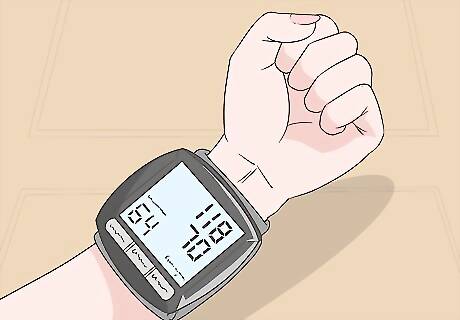
Have your CBP measured with a cuff device for a quick and easy test. There are several devices on the market that can automatically estimate your central blood pressure based on a reading taken from your arm with a cuff. If your doctor recommends CBP monitoring for you, ask if they have one of these devices available. Cuff-based devices for estimating central blood pressure may be slightly less accurate than other types of devices, such as tonometers. However, they’re also easier to use, so there’s less chance of an inexperienced user taking a reading incorrectly.
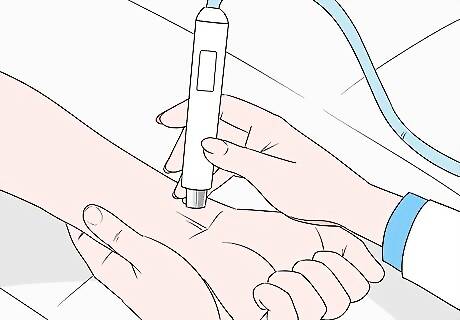
Discuss having non-invasive tests done with a tonometer. A tonometer is a wand-like device that measures pressure in your arteries through a flat sensor on one end. Your doctor will measure your blood pressure by pressing a tonometer against your carotid artery (in your neck) or your radial artery (in your wrist). They can then do calculations to estimate your central blood pressure based on the tonometer readings. Tonometers require a lot of skill to use correctly, so it’s important to have this kind of reading done by an experienced healthcare professional.
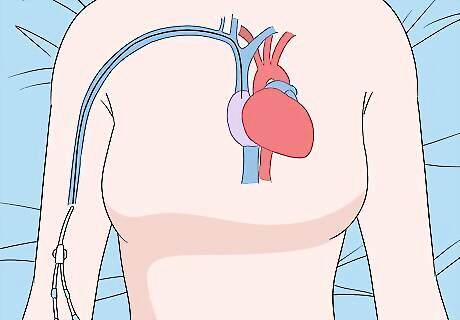
Get a catheter blood test measurement if you’re a high-risk patient. If you’re critically ill or need to undergo a risky medical procedure, your medical care team might need to monitor your central blood pressure directly. In order to test your blood pressure this way, your doctor will thread a catheter (a long, thin plastic tube) into your aorta through an artery in your armpit or groin. A sensor on the end of the catheter will measure the pressure inside your aorta. This is the most accurate way to measure central blood pressure, but it’s also the most invasive. This method isn’t practical for testing during a routine office visit.
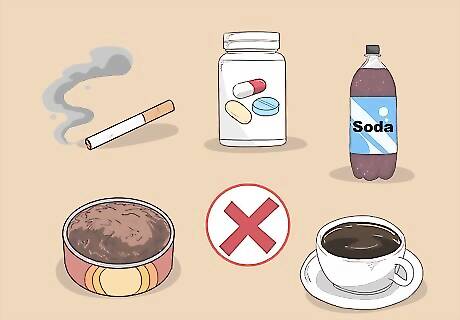
Avoid using substances that might affect your BP before the test. Substances like caffeine, nicotine, and certain medications can affect your blood pressure and cause misleading test results. Give your doctor a full list of any medications or supplements you’re taking, and ask if there’s anything you should avoid before having your CBP measured. Your doctor might also recommend that you avoid exercising right before your blood pressure test.
Treating High Central Blood Pressure

Talk to your doctor about making lifestyle changes. If you have high central blood pressure, your doctor may recommend that you make changes to your diet and activity levels. Discuss making changes such as eating a low-sodium diet, getting more exercise, and limiting how much alcohol you drink. Depending on the cause and severity of your high blood pressure, this might be enough to keep your blood pressure under control. Even if you need medications to control your blood pressure, it’s important to make healthy lifestyle choices so that the medicines can work properly.
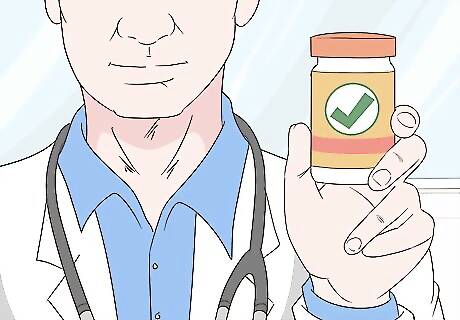
Ask about blood pressure medications for severe hypertension. If lifestyle changes aren’t enough to keep your central blood pressure at a healthy level, your doctor might prescribe medications to help. Some medications may be especially helpful for lowering central blood pressure as opposed to peripheral blood pressure. Ask your doctor about medications such as: Calcium channel blockers ACE inhibitors Angiotensin receptor blockers

Work with your doctor to adjust your treatment based on CBP readings. Central blood pressure reacts differently to certain medications than peripheral blood pressure. If your doctor is treating you for high central blood pressure, they may need to measure your CBP regularly to make sure your medications or other treatments are working. See your doctor for checkups as often as recommended, and talk about making adjustments if necessary. For example, if your central blood pressure is still high, your doctor might recommend adjusting your dose or switching to a new medication.












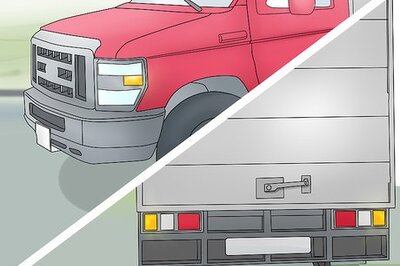







Comments
0 comment